Let's Reboot... The Secret Of Monkey Island
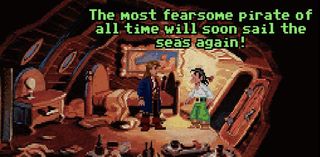
Our Monkey Island reboot isn't an open world game by any stretch, though it does operate on a number of different scales - to both allow freedom to actually play pirate once you've acquired a ship from the first island, and tightly lock things down for the sake of plot and comedy and puzzles.
Essentially, it's a game with three scales - open water, islands exploration, and set-pieces - and not just for purposes of throwing in a couple more game modes, as we'll get to in a moment. If we're going to give the player a ship, it seems like a complete waste to only use it for a map screen. Instead, this is where we get to reinforce the piratey side of the game - three sheets to the wind, and some freedom to explore, find lost treasure, have battles and offer a kind of home base to play with. The reboot nature of the story even handily resets Guybrush's competence level - things are different now.
Exploration would be limited by a few things, including initially impassable environmental hazards and your sailing range. Each island or other point on the critical path unlocks the next, but you can also go out of your way to explore, find buried treasure, raid more challenging opponents than the ones on the critical path, and such. Guybrush would also have his Captain's Cabin, slowly filling up with tchotchkes and trophies and photos either bought with plundered gold or automatically unlocked by progress - think Alpha Protocol, but taken to the level of the Phatt Island Wanted Poster . Photos for instance could be clearly staged for effect rather than actually showing what happened, or a grateful pirate show his gratitude with a present - a clearly ticking time-bomb that blows up during the end credits.
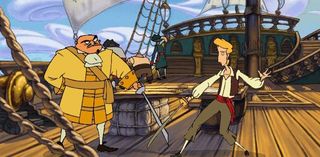
Mostly, this would be to restore some of the freedom lost by a linear story. There is however at least one crossover point where Guybrush has to demonstrate his piracy skills by raising enough money to get into a location. Instead of the Three Trials system though, it would simply be going out to do things like raiding ships or finding buried treasure by decoding cryptic maps until you have enough. Later, these remain available as opportunistic things, but mostly for the benefit of completeness, Achievements, hunting for weird and wonderful Easter Eggs on the edges of the map, or just taking a break.
The two worlds can also meet in other ways, such as a 'random' encounter on the high seas that pays back later on, or the chance to bribe someone instead of solving a particularly difficult logic puzzle. In most cases though, money remains useless and puzzles still have to be solved via good old wit and moxie. These sequences exist to make the world feel larger and back up the atmosphere, not replace the adventuring bits. Even if the adventuring is itself quite a bit different to before...
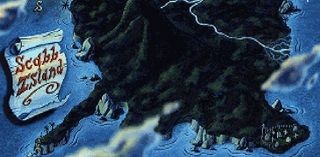
As before, most of the real adventure takes place on land - and if you've played The Walking Dead or Heavy Rain, you probably have a rough idea where this is going. We're not talking QTEs though, at least not on anything like that scale. Instead, we're talking set-piece design. Mostly.
The second scale level in the reboot is island exploration, which uses a combination of classic maps and hub type areas for wandering and disposable gags. These play out much like adventuring of old. You can pick up items, being restricted to things that you could reasonably pick up, and temporarily carry any heavier ones. Pretty standard stuff, mostly there to talk to characters at will, collect sub-quests like treasure maps or pointers to things to go find on the open seas, or gain access to the next plot area or areas, depending on how many objectives are currently on the slate.
The biggest gaming news, reviews and hardware deals
Keep up to date with the most important stories and the best deals, as picked by the PC Gamer team.
The best stuff though is in sealed off spaces (not necessarily interiors) that are self-contained, so you never have to worry about whether you have what you need, and built around scenes as much as puzzles. Comedy. Drama. Dramedy. Even Comedra, if it's not fighting Godzilla. These wouldn't be Assassin's Creed style mission markers or anything so crude, and there would be some things outside to help blur the lines more than, say, Star Wars: The Old Republic's GIANT GREEN QUEST WALLS!
At their simplest, these sequences would be very similar to classic puzzle solving adventuring, just with the benefit of knowing you definitely have access to what you need and thus won't need to spend hours pixel-bitching across multiple islands for something you missed. At other times, you'd strap in for a non-stop parade of silliness, humiliation congas or genuine drama - LeChuck and his army burning down a port for instance and Guybrush having to escape, or the two fighting and Guybrush having to buy time with a useless sword until he can manouver a way to jump out of a window and swim away.
(CLARIFICATION EDIT: As an example from the existing games, think Elaine's party in Monkey Island 2. You'd get in with the dress and invitation, have the run of the place, do a couple of puzzles and talk to people, and get the map piece or equivalent goal. You just wouldn't leave until you were done, and would know that you had everything you needed on hand, keeping the focus tighter.)
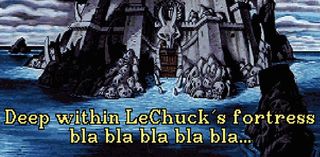
On the surface, that sounds limited, and the result would likely be easier than the classic games - though given how fast people go for walkthroughs these days, adventures are honestly better off going for experiences rather than challenges. You could have a stealthy bit combined with an observation puzzle for instance, or a complex room escape in a jail cell; a scene devoted entirely to a conversation, or a fiendish puzzle that absolutely would not be a sliding block job. As long as things kept changing up and the story never ground to a halt if people didn't want to go smell the flowers, it'd work.
The main advantage of set-piece design though is that it allows for far, far more authorial control, and thus much funnier staging and writing. With a suitable gimmick to either rewind or negate death without forcing the player to sit through the same joke a million times, you open up so many more comedy techniques than pure cut-scenes or individual lines will ever allow. On its own, it would feel ultra-linear and distinctly lacking in agency. The ability to have a couple puzzle lines running at once would dilute that though, as would the ability to hit the water and feel some sense of direct player agency.
Still a hell of a challenge - writing, choreography and execution? Yep. But we have a big fictional budget, and as such, can hire the best fictional people for the job. And you can't put a price on that.
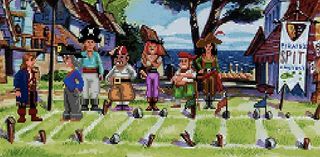
And that's our imaginary Secret Of Monkey Island reboot - not a sequel, but one possible way forward. How would you reboot the series for modern audiences and current technology? Squirt your brain-thoughts below, and keep your eyes out for more armchair hypotheticals soon.
Most Popular







